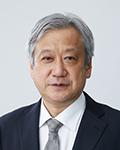- HOME
- Research
- Researcher's Profile
- Kenji TATSUNO
Researcher's Profile

- Project Associate Professor
- Kenji TATSUNO
- Genome Science & Medicine
- tatsuno
 genome.rcast.u-tokyo.ac.jp
genome.rcast.u-tokyo.ac.jp
- Tel
- 03-5452-5238
- FAX
- 03-5452-5406
- URL
Biography
| March 1989 | Faculty of Engineering, The University of Tokyo (UTokyo) |
|---|---|
| March 1991 | Master of Engineering, School of Engineering, UTokyo |
| April 1991 | Nippon Roche Research Center |
| September 2007 | PhD, School of Engineering, UTokyo |
| October 2007 | Joint Research Fellow, RCAST, UTokyo |
| April 2008 | Project Researcher, RCAST, UTokyo |
| June 2018 | Visiting Associate Professor, Research and Development Center for Precision Medicine (PMC), University of Tsukuba |
| April 2021 | Project Associate Professor, RCAST, UTokyo |
Research Interests
Cancer is a disease caused by a wide range of genomic abnormalities, from single nucleotide variations to large-scale structural changes such as chromosomal deletions and translocations. In addition, it has become clear that acquired genomic modifications such as DNA or histone methylation and post-transcriptional modifications of RNA also contribute to the development and progression of cancer. Next-generation sequencers (NGS) have not only enabled comprehensive and systematic analysis of these genomic and transcriptome abnormalities, but also make it possible to connect multidimensional information produced by various NGS applications by "genome sequences". Today, “NGS” has become an important technology for the integrated analysis of complex biological processes.
We are proceeding with a large-scale genome analysis project aimed at elucidating the pathophysiology of cancer and searching for therapeutic targets. In addition, we are developing analysis methods that integrate multidimensional information such as single read analysis or long-read sequencing produced by NGS applications, aiming to elucidate complex and diverse carcinogenic mechanisms that could not be analyzed by conventional methods.
To apply these research experiences to clinical practice, we collaborate with the "Next Generation Precision Medicine Development Course" of the Graduate School of Medicine, the University of Tokyo. In this collaboration, we are developing "Next-Generation Precision Medicine" that explore for novel therapeutic targets, cancer diagnosis, and effective treatment selections by integrating multidimensional NGS data obtained from new oncogene panel tests.
Keywords
Clinical Cancer Sequence, Cancer Genome Analysis, Virus Capture Sequence

